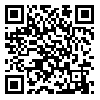Volume 8, Issue 4 (Autumn 2020)
PCP 2020, 8(4): 297-306 |
Back to browse issues page
Download citation:
BibTeX | RIS | EndNote | Medlars | ProCite | Reference Manager | RefWorks
Send citation to:



BibTeX | RIS | EndNote | Medlars | ProCite | Reference Manager | RefWorks
Send citation to:
Sepahvand T, Karami K. Explaining Anger in Atypical Social Anxiety Disorder Based on Impulsivity and Risk Perception. PCP 2020; 8 (4) :297-306
URL: http://jpcp.uswr.ac.ir/article-1-690-en.html
URL: http://jpcp.uswr.ac.ir/article-1-690-en.html
1- Department of Psychology, Faculty of Humanities, Arak University, Arak, Iran. , t-sepahvand@araku.ac.ir
2- Department of Psychology, Faculty of Humanities, Borujerd Branch Azad University, Borujerd, Iran.
2- Department of Psychology, Faculty of Humanities, Borujerd Branch Azad University, Borujerd, Iran.
Abstract: (3655 Views)
Objective: The present research aimed at explaining anger in individuals with the atypical pattern of Social Anxiety Disorder (SAD) based on impulsivity and risk perception.
Methods: The present study used a cross-sectional design. The research population included all students of Arak University; of which, 450 individuals were selected by convenience sampling method. Firstly, the Social Phobia Inventory, Dickman Impulsivity Inventory, Risk Perception Scale, and Novaco Anger Scale were performed in them. Then, based on their obtained scores in social anxiety, 124 individuals with scores ≥19 were selected as the final research sample.
Results: Multiple regression data indicated that impulsivity and risk perception predict 36% of the variance of anger in individuals with social anxiety (F2, 121=33.70, P<0.001); impulsivity directly (Beta=0.423) and risk perception inversely (Beta=-0.297) presented a significant contribution in predicting the study subjects’ anger.
Conclusion: It is necessary to pay serious attention to impulsivity and risk perception in understanding and treating individuals with SAD and their anger.
Methods: The present study used a cross-sectional design. The research population included all students of Arak University; of which, 450 individuals were selected by convenience sampling method. Firstly, the Social Phobia Inventory, Dickman Impulsivity Inventory, Risk Perception Scale, and Novaco Anger Scale were performed in them. Then, based on their obtained scores in social anxiety, 124 individuals with scores ≥19 were selected as the final research sample.
Results: Multiple regression data indicated that impulsivity and risk perception predict 36% of the variance of anger in individuals with social anxiety (F2, 121=33.70, P<0.001); impulsivity directly (Beta=0.423) and risk perception inversely (Beta=-0.297) presented a significant contribution in predicting the study subjects’ anger.
Conclusion: It is necessary to pay serious attention to impulsivity and risk perception in understanding and treating individuals with SAD and their anger.
Type of Study: Original Research Article |
Subject:
Cognitive behavioral
Received: 2020/01/4 | Accepted: 2020/08/24 | Published: 2020/10/1
Received: 2020/01/4 | Accepted: 2020/08/24 | Published: 2020/10/1
| Rights and permissions | |
 |
This work is licensed under a Creative Commons Attribution-NonCommercial 4.0 International License. |








